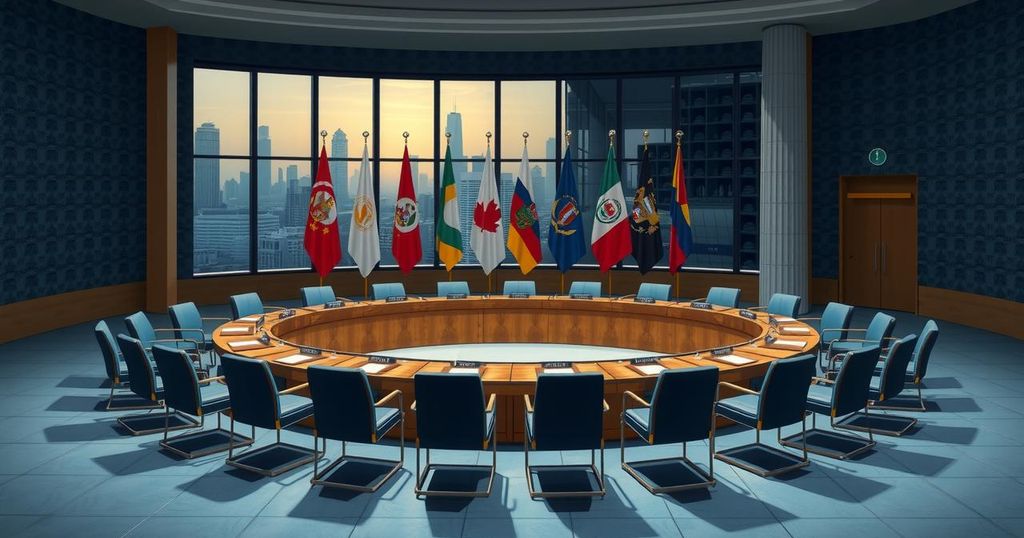Key Players Tangle at UNSC at ‘Perilous Turn’ of US-Israel-Iran Conflict

The UN Security Council convened an emergency session due to US strikes on Iranian nuclear facilities, provoking condemnations from Iran and allies, while the US and Israel defended the actions. Russia, China, and Pakistan proposed a resolution for an immediate ceasefire, yet its passage appears unlikely owing to expected US opposition. UN Secretary-General Antonio Guterres warned of potential retaliation spirals, urging urgent action. Meanwhile, US officials maintained that the strikes were necessary for security interests.
Tensions escalated at the United Nations Security Council (UNSC) in response to recent US military strikes on Iranian nuclear facilities. This emergency session resulted in condemnation from multiple member states, including Iran and its allies, while the US and Israel defended the actions. This confrontation comes as calls for an immediate ceasefire in the increasingly volatile Middle East are amplified.
Russia, China, and Pakistan have put forth a resolution calling for an “immediate and unconditional ceasefire,” according to diplomats familiar with the draft updated on Sunday. Notably, the resolution does not specify the United States or Israel, though it explicitly denounces the strikes on Iranian facilities. Currently, a voting schedule has not been set, which leaves the proposal in limbo.
For the resolution to pass, it requires support from at least nine members of the council and must avoid vetoes from any of the five permanent members — namely, the US, UK, France, Russia, and China. Given that the US would likely not self-censure, the resolution may face a significant uphill battle.
During the session, UN Secretary-General Antonio Guterres expressed grave concern, emphasizing the precarious state of the region. “The bombing of Iranian nuclear facilities by the United States marks a perilous turn in a region that is already reeling,” he warned. Guterres urged immediate action to prevent an escalation of conflict and to revive sincere negotiations regarding Iran’s nuclear program.
Acting US ambassador Dorothy Shea justified the military actions, asserting that they were necessary to counter Iran’s nuclear enrichment capabilities and protect American citizens and allies. “The time finally came for the United States, in defence of its ally and our own interests, to act decisively,” Shea declared, adding that any aggressive actions from Iran would invoke harsh retaliation.
Conversely, Iran’s Ambassador Ali Bahreini criticized the US and Israel, suggesting that their aggressive actions were politically motivated and a direct assault on diplomatic efforts. He warned that Iran would determine its response. “The Iranian military will decide on the timing, nature and scale of our response,” he stated firmly.
Israeli envoy Danny Danon dismissed the call for condemnation, arguing that the recent attacks enhanced global safety. He emphasized that the fate of Iran was a decision for its people alone, when queried about the possibility of regime change in Tehran.
China’s envoy Fu Cong condemned the US strikes and cautioned against further escalation, asserting that an immediate ceasefire was necessary. Russian envoy Vasily Nebenzya described the US actions as indicative of a larger disregard for global standards, stating, “The US has opened a Pandora’s box. No one knows what catastrophe or suffering will follow.”
Pakistan’s ambassador Asim Iftikhar Ahmad echoed the condemnation of violence, expressing solidarity with Iran. He voiced concerns over the spike in aggression resulting from Israeli actions, characterizing the situation as deeply troubling. This appeal for solidarity follows Pakistan’s prior suggestion that former US President Donald Trump be nominated for the Nobel Peace Prize for his role in the conflict.
Meanwhile, the head of the International Atomic Energy Agency (IAEA), Rafael Grossi, reported that damage to Iran’s nuclear sites was significant, with craters visible at facilities like Fordow, while Natanz had again experienced attacks. Iran has vocally criticized Grossi for allegedly facilitating conditions that enabled these strikes.
Notably, the IAEA Board of Governors had just passed a resolution declaring Iran non-compliant with its international nuclear safeguards ahead of Israel’s key offensive, ramping up the tensions surrounding the already critical situation.
The recent emergency session at the UNSC highlights the deepening rift following US military strikes on Iranian nuclear sites. The calls for ceasefire from multiple nations underscore a growing concern over escalating violence in the region. With tensions high and accusations flying, the path forward remains fraught with challenges as diplomatic efforts continue to stall amidst rising hostilities. The international community is now faced with pressing questions on how to navigate this crisis without further escalation of conflict.
Original Source: www.aljazeera.com








